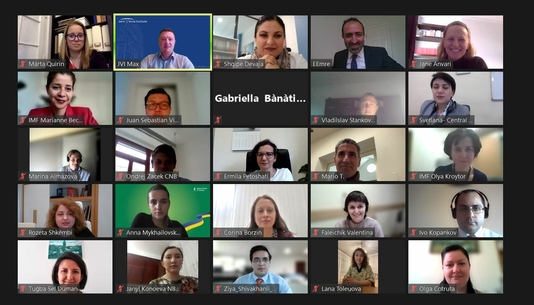Two perspectives on bank supervision and resolution arrangements
June 24, 2022
Many countries in the JVI region have recently strengthened or are in the process of strengthening their institutional, legal, and policy arrangements necessary for sound bank supervision, resolution, and crisis management. The IMF strongly supports these reforms, including by providing technical assistance, given that adequate legal and policy frameworks in these areas are essential to preserve financial stability while minimizing costs to taxpayers. The JVI has been contributing to these efforts by hosting courses to help officials from the region expand their understanding of international good practices in these areas so they can advise on the development of legal and policy frameworks in their jurisdictions. In that context, two separate but interrelated IMF courses were organized this spring: one focusing on legal issues, and the other on policy and operational aspects. This article provides a brief overview of these courses and participants’ reactions.
The IMF Legal Department’s virtual course on “Legal Frameworks for Bank Supervision and Resolution: Key Themes and Emerging Legal Developments” (LBSR) was delivered between April 18-22, 2022. This was the first time this course was offered at JVI since 2017, and the first time it took place virtually. As suggested by its title, the course specifically focused on legal aspects, and was attended by 33 participants (mostly senior legal counsels and supervisors) from 21 countries.
The core component of LBSR covered an overview of the global trends in bank supervision and resolution, followed by modules on selected legal issues in the regulation and supervision of banks, enforcement and early intervention frameworks, as well as crisis management and resolution (including the design of the relevant legal frameworks, resolution tools and funding, and legal safeguards and judicial review of resolution decisions), and bank liquidation frameworks.
In addition to these “core” topics, and for the first time, the latter were supplemented by new lectures on emerging legal developments. These lectures covered legal issues related to climate change and banking laws, and digitalization of financial services. The new components were built on the IMF Legal Department’s previous and ongoing work in these respective areas (e.g., legal considerations on the interaction between climate change policies and banking laws and a stocktaking of current legal issues on stablecoins). The discussions on climate change were enriched by a participant presentation and discussions with Professor Rosa Lastra (Queen Mary University of London). Lectures were complemented by participants’ interventions, quizzes, and workshop-style discussions.
The IMF Monetary and Capital Market Department’s virtual course on “Bank Restructuring and Resolution” (BRR) was delivered during May 2-6, focusing on conceptual policy and operational issues. This was the sixth consecutive year of delivering the BRR and the third time in virtual format. It was attended by 21 participants from 9 countries, with experience in problem bank supervision, bank resolution, crisis management, and the operation of the financial safety net.
Drawing on international good practice and the IMF´s practical experience with addressing banking sector distress, the BRR lecturers provided guidance on crisis preparedness and management. Topics covered included identification of weak banks, development of strategies for dealing with such banks, the elements of effective strategies for bank restructuring and resolution, differentiation between systemically important institutions and non-systemic institutions, good practices for bank recapitalization and the role of recapitalization programs in crisis management strategies, cross-border resolution and options for dealing with distressed assets. The lectures included several case studies from previous crisis episodes and were supplemented by two exercises on bank resolution and bank recapitalization, where participants worked in groups to analyze fact patterns and discuss policy options. This year, discussions benefitted from the participation of Antonio Carrascosa, former permanent member of the Single Resolution Board of the European Banking Authority and currently a Director of Ernst and Young, and Financial Stability Chair at the University of Navarra, Spain.
Both courses were well-received. The participants took advantage of discussions with the lecturers and peers and expressed appreciation for the level of engagement during the course, despite being conducted virtually. They noted that the skills gained during the course would be helpful for their job and professional development. The participants welcomed the integration of emerging legal developments into the LBSR course, and in fact they asked for more going forward both in terms of the depth and width of emerging topics covered. Participants in the BRR course appreciated particularly the case studies and related discussions. Some of the areas for improvement noted by the participants related to the virtual format of the course delivery, limiting time and opportunities for interaction while courses covered a wide range of topics.
Edda Ros Karlsdottir, Olya Kroytor, and Ender Emre, IMF










